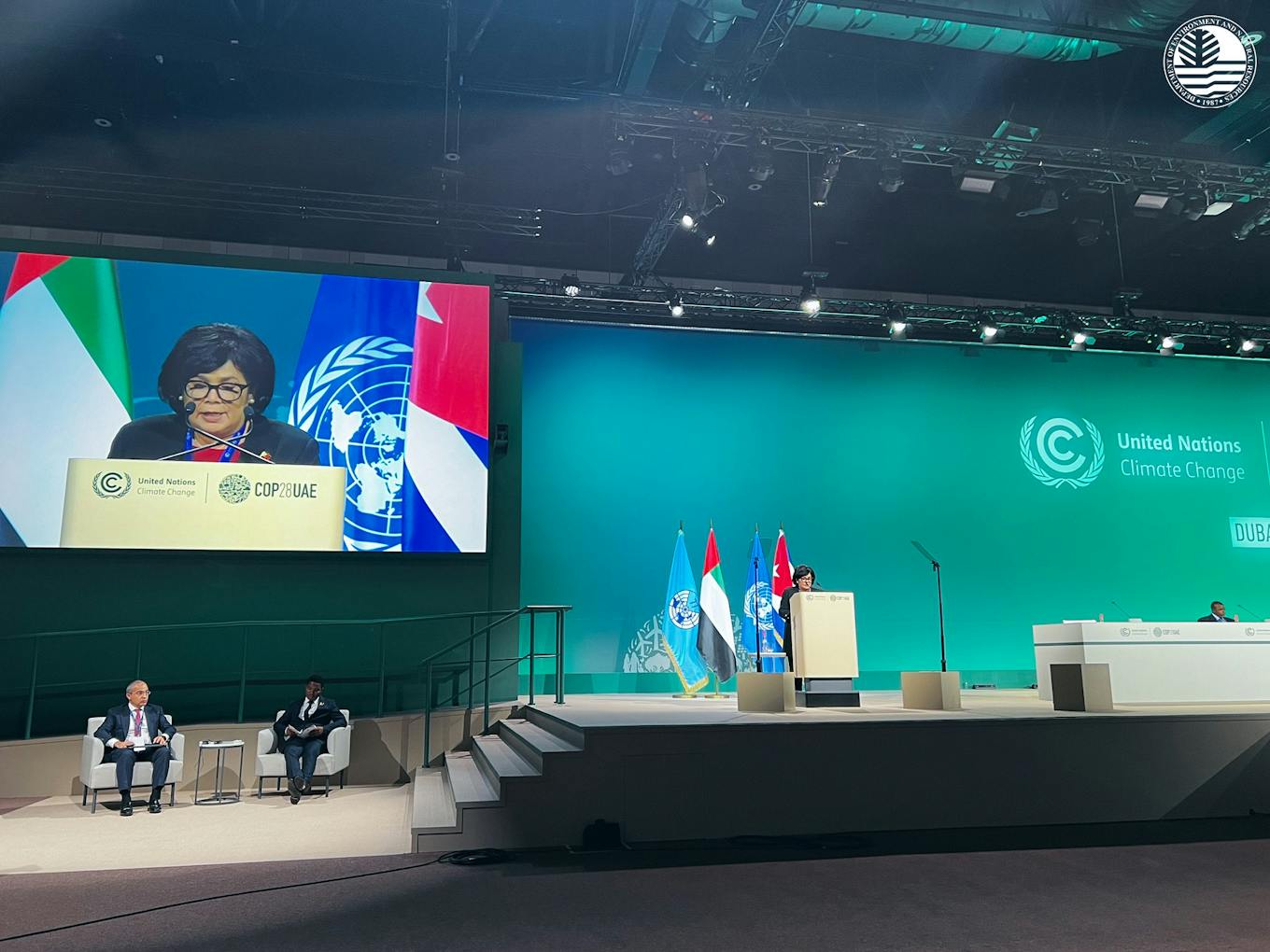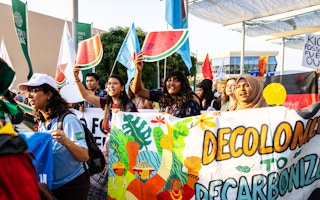In the remaining hours of COP28 negotiations, Filipino civil society leaders have urged the Philippine delegation to come out with a stronger position on phasing out fossil fuels, as they believe its voice can be instrumental in the final decision that global leaders will take.
To continue reading, subscribe to Eco‑Business.
There's something for everyone. We offer a range of subscription plans.
- Access our stories and receive our Insights Weekly newsletter with the free EB Member plan.
- Unlock unlimited access to our content and archive with EB Circle.
- Publish your content with EB Premium.
The United Nation’s climate body published on Monday its latest draft text on what is known as the global stocktake – a crucial part of this year’s COP talks that assesses where the world is at with its climate goals and how it can reach them.
The watered-down draft, with its latest revision, no longer contains any mention of a “phase-out” of fossil fuels, stating only that all consumption and production of the dirty fuels should be reduced.
“At this critical time, we urge the Philippine delegation to exhaust all means to push back and hold the line. Not doing so falls short of the climate leadership exhibited by the Philippine climate movement [and] is a disgrace to all victims of climate disasters and an abandonment of [the] 1.5°C [goal],” said Gerry Arances, convenor of Power for People Coalition (P4P), a network of civil society organisations, communities and cooperatives that rally against pollutive fuels.
“
At this critical time, we urge the Philippine delegation to exhaust all means to push back and hold the line. Not doing so falls short of the climate leadership exhibited by the Philippine climate movement…
Gerry Arances, convenor, Power for People Coalition
Past experience shows that the Philippines doing so can make a difference. Arances highlighted how the Philippines has been instrumental in asserting loss and damage reparations and the delivery of resources owed to vulnerable peoples at COP19 in Warsaw, Poland in 2013, at the height of Typhoon Haiyan, the deadliest cyclone to hit the Philippines.
It was in that conference where Naderev Saño, the Philippines lead negotiator and the country’s climate change commissioner, said he was embarking on a fast for the duration of the two-week negotiations, until meaningful pledges were made on climate finance, a loss and damage mechanism agreed on and other action taken.
The Philippines also led vulnerable countries in fighting to have the 1.5°C goal in the Paris Agreement in 2015. It was when the head of delegation Emmanuel De Guzman asserted that there would be no accord without a reference to the 1.5°C goal in the draft agreement. Then, there were interventions to have the warming limit set at a higher threshold of 2°C, which the Philippines found unacceptable.
Krishna Ariola, co-founder of Youth for Climate Hope, a grassroots youth-led movement for climate action, said the Philippine voice this time round is not as convincing as it was in past conferences.
“It is crucial for the Philippines to add its voice and continue to build pressure in prioritising putting that language into text because it is very decisive in what could happen,” Ariola said, referring to clearly including the call for a “phase-out” of fossil fuels in the global stocktake agreement. “The Philippines must weigh in [with its views] and take on an instrumental role as it did in Warsaw and in Paris.”
The draft text is currently being discussed by government officials behind closed doors. The deadline for a conclusion is Tuesday morning but COP talks can often overrun.
COP28 President Sultan Al Jaber told the nearly 200 countries at the talks to ramp up efforts to finalise a deal ahead of the scheduled close of the conference on Tuesday: “You know what remains to be agreed. And you know that I want you to deliver the highest ambition on all items, including on fossil fuel language. If I can help, my door remains wide open to all of you. You have already shown what a different mindset and a flexible approach can deliver.”
‘Nothing to lose’
So far, the Philippines has not provided clear wording for its stance on fossil fuels.
In its country intervention delivered at the COP28 plenary meeting last Friday, environment secretary and head of delegation Ma Antonia Yulo-Loyzaga said: “We must take into consideration the historical responsibility on greenhouse gas emissions and the needed deep and rapid cuts towards limiting global warming consistent with the Paris Agreement.”

Environment secretary Ma Antonia Yulo-Loyzaga delivering the Philippines’ country statement on 4 December on behalf of president Ferdinand Marcos, Jr. at the COP28 climate summit. Image: DENR
Unlike emerging economies like China and Saudi Arabia which are opposing a phase-out mention in the text, the Philippines has “nothing to lose” as its economy is not fossil fuels-based, said Arances.
“The indecisiveness of the Philippines delegation on the issue of a fossil fuel phase-out is reflective of the government’s policy incoherence,” he said at a live press briefing, expressing his disappointment that the Philippines has not taken a clearer line in supporting stronger anti-fossil fuel language. “We are touted as one of the countries in the world with some of the best environmental and climate change laws, but fossil fuels still dominate in our energy plans.
Ian Rivera, national coordinator of the Philippine Movement for Climate Justice, an alliance of 150 national civil society networks, urged Loyzaga not to “leave it all up to” the department of energy to decide on the country’s energy transition especially since the country’s energy plan does not contain mentions of a coal phase-out.
In a television interview on Saturday, Loyzaga was asked if the Philippines was signing the pledge to drive adoption of renewables and energy efficiency initiatives at the COP28 climate summit.
“I think the energy situation for every country is unique and we defer to the position of the department of energy on where we should be taking ourselves in terms of the pace and the trajectory of our renewable energy transition. They understand the big picture, as well as the implications on the ground in terms of our own capability in managing the transition,” Loyzaga said.
The Global Renewables And Energy Efficiency pledge calls for a global effort to triple renewable energy capacity to at least 11 terawatts by 2030, and to double the rate of energy efficiency improvements, without mandating such targets on individual countries. It has been signed by 123 countries, including Southeast Asian economies like Thailand, Brunei, Malaysia and Singapore.
Want more Philippines ESG and sustainability news and views? Subscribe to our Eco-Business Philippines newsletter here.





















